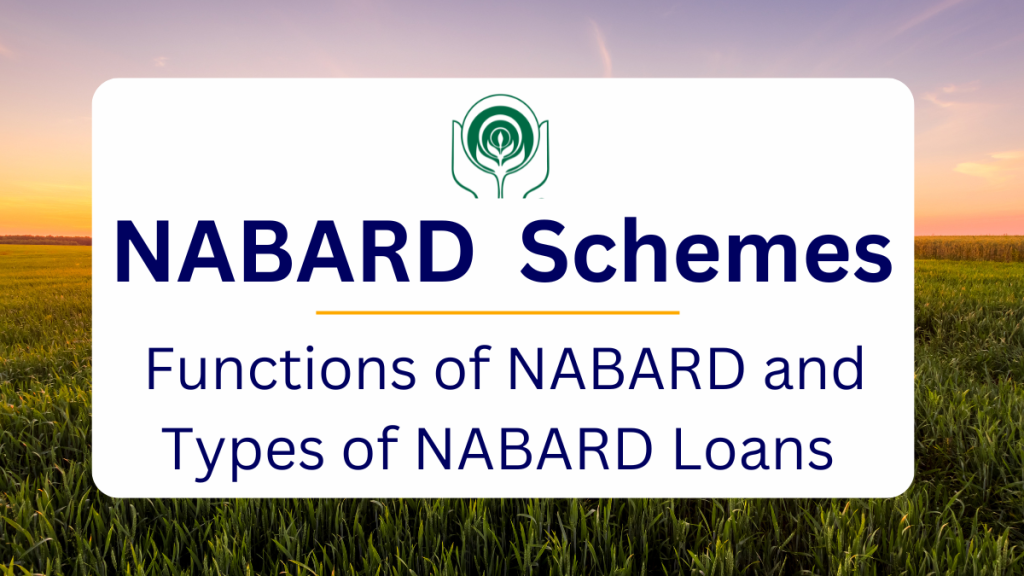The National Bank for Agriculture and Rural Development (NABARD) plays a key role in shaping the economic framework of rural India. Founded in 1982, NABARD is a key Indian government institution, offering financial and growth support to the farming and rural sectors of the nation. NABARD’s mission goes beyond that of a typical bank. It aims to uplift rural communities and reduce the financial gap between rural and urban communities.
The growth of rural areas is fundamental to a strong national economy. A secure rural sector ensures food supply, encourages small businesses and creates jobs. Yet, many in rural regions lack access to formal finance. This lack of access stops them from investing in farming, related activities, and small enterprises, affecting their economic progress and quality of life.

NABARD was established to tackle these issues. It serves as a refinancing body, giving loans to rural finance institutions (RFIs) at reduced rates. NABARD also plays a part in designing and running development projects for rural locales. Through various initiatives, NABARD pushes for financial awareness, oversees RFIs, and backs key areas like agriculture, infrastructure growth, and rural businesses. By performing these varied roles, NABARD acts as a driving force for empowering rural India and achieving inclusive growth.
Functions of NABARD
NABARD came to life after it was clear that old ways of lending money couldn’t well meet the unique needs of rural India. In 1979, a committee recommended setting up a dedicated body to tackle these issues. Thus, NABARD was born to take on the agricultural lending roles previously held by the Reserve Bank of India (RBI) and the refinancing duties of the Agricultural Refinance and Development Corporation.
Here are the key roles NABARD plays:
Refinancing
As a refinancing agency, NABARD gives loans to rural financial bodies such as Regional Rural Banks (RRBs) and cooperative banks at reduced rates. This arrangement enables these banks to offer lower-cost loans to farmers, rural business owners, and self-help groups (SHGs), making credit more accessible to them.
Promotional Schemes
NABARD runs schemes aimed at boosting agriculture, ancillary sectors, and rural growth. These include providing loans with lower interest rates, credit protections, and other financial aids. This support makes it easier for projects related to irrigation, upgrading farm equipment, starting small ventures, and improving infrastructures post-harvest to get credit.
Regulatory Oversight
NABARD also serves as the chief regulatory body for cooperative banks and RRBs, ensuring these entities follow proper banking practices, maintain financial health, and adhere to applicable rules. This approach promotes proper lending and safeguards rural depositors and borrowers.
Capacity Building
In its capacity-building role, NABARD inspects and audits RRBs and cooperative banks while offering training and development programs to bolster their operational capacity, risk management approaches, and overall efficiency in serving rural communities.
District Credit Plans (DCPs)
NABARD plays a role in putting together District Credit Plans with banks and state governments. These plans map out the credit needs for different rural development activities at the district level, making sure credit matches local needs and priorities.
Project Development
On project development, NABARD identifies and outlines projects for rural progress, covering rural infrastructure, farm mechanization promotion, agricultural produce market linkages, and micro-enterprise development. Through such initiatives, NABARD actively fosters a supportive environment for rural advancement.
Policy Advocacy
Although NABARD does not directly set national policies, it significantly influences rural financial sector policy through research, data analysis, and recommendations to the government and RBI. It advises on policies to enhance financial inclusion, improve rural credit accessibility, and strengthen the rural development institutional framework.
By performing these wide-ranging functions, NABARD stands as a key entity in shaping rural India’s financial scenario. Its comprehensive approach not only facilitates credit flow but also promotes financial stability and nurtures conditions favorable for agricultural innovation, rural entrepreneurship, and broad-scale rural advancement.
Now that we understand the role that NABARD plays in the development of the nation’s rural sector; to further our understanding of its benefits and roles, we will explore the different kinds of loans offered by NABARD to support its inititatives for rural settings and residents.
Different Types of Loans by NABARD
NABARD’s commitment to rural development goes beyond just a single scheme. It offers a diverse range of loan programs for the specific needs of various sectors and demographics within rural India. Let’s explore some of the key schemes offered by NABARD:
Composite Loan Scheme (CLS)
The Composite Loan Scheme (CLS) is a crucial initiative launched by NABARD to support the growth and development of micro and small enterprises (MSEs) in rural India. The maximum refinance under the Composite Loan Scheme is 10 lacs. It addresses the specific needs of these businesses by providing them with a comprehensive financial solution. The CLS addresses this by offering a combined solution.
The first component includes catering to the day-to-day operational expenses of the enterprise, such as purchasing raw materials, paying wages, and meeting utility bills. The other solution that CLS provides is that it offers long-term financing for investments in fixed assets like machinery, equipment, and infrastructure development.
Integrated Loan Scheme (ILS)
The Integrated Loan Scheme (ILS) targets farmers seeking a comprehensive financial solution for their agricultural and allied activities. It combines term loans and working capital loans. The term loan finances long-term investments in land development, farm machinery, livestock purchase, and infrastructure development for allied activities like dairy farming or fisheries and the working capital loan caters to operational expenses like purchasing seeds, fertilizers, and feed for livestock. The maximum refinance available under ILS is Rs. 15 lacs per borrower. This sets a limit on the total loan amount that NABARD will refinance for individual farmers through RFIs.
Self-Employment Scheme for Ex-Servicemen (SEMFEX)
NABARD is vital in driving SEMFEX forward. NABARD extends refinance support to banks through its Automatic Refinance Facility (ARF). This action means NABARD gives loans at lower rates to banks, helping these banks offer loans to ex-servicemen under SEMFEX with better interest rates. SEMFEX taps into the unique skills and discipline of ex-servicemen. The plan backs credit for a range of agricultural and allied tasks in rural zones. They might start dairy farms, poultry operations, or dive into gardening and fish farming. The scheme also gets that not every ex-serviceman may pick a farm-based path. SEMFEX equally aids in setting up non-farm projects in rural locales. This allows them to initiate micro or small ventures in diverse fields like making goods, processing, or offering services.
Soft Loan Assistance for Margin Money (SLAMM)
This plan aims to support budding entrepreneurs in rural India. It acknowledges that having business talent and skills is not the only necessity. Many potential business founders do not have the initial funds needed to meet the margin money demands by NABARD for various refinance plans. Margin money is a part of the full project cost that the borrower must pay from their funds. It serves as a safety fund for the lender and shows the borrower’s dedication to the project. Yet, for many aspiring entrepreneurs, especially in rural zones, gathering this initial amount can pose a significant challenge.
The SLAMM scheme is designed to address this issue. It offers financial support in the form of a soft loan, aimed precisely at covering the margin money requirement for other NABARD refinance schemes. Soft loans often come with lower interest rates than standard commercial loans, making them a more economical choice for borrowers.
Small Road and Water Transport Operators (SRWTO)
NABARD’s Small Road and Water Transport Operators (SRWTO) scheme is designed to enhance rural connectivity and support the transportation sector in India. This initiative recognizes the crucial role that efficient transportation plays in facilitating the movement of goods and people within rural areas and between rural and urban centers. The SRWTO scheme provides financial assistance to individuals and small businesses involved in road and water transport.
This assistance is specifically targeted at the acquisition of transport vehicles. This can include small trucks and tempos used for transporting agricultural produce or industrial products from rural areas to markets and vice versa. it also covers passenger transport vehicles like minibuses or vans that cater to the transportation needs of rural communities and water transport units, such as boats or barges, operating on inland waterways to facilitate the movement of goods in geographically challenging regions. The margin money assistance under this loan scheme will be extended on a very selective basis, up to 10% of the vehicle’s cost.
Rural Housing Loans
NABARD fully grasps the complex role that adequate housing plays in rural spaces. In these communities, homes are not merely places to live; they also double as sites for farming tasks and small enterprises. NABARD, understanding this dual function’s essential contribution to rural progress, serves as a refinancing entity, supplying investment loans to qualifying banks. This refinancing aid allows these banks to extend credit at more favorable rates to those wishing to build or upgrade their residences in countryside areas. By offering refinancing to banks, NABARD effectively narrows the divide between the need for housing loans in rural locales and the accessibility of funds from commercial lenders. This initiative simplifies the process for individuals, especially those with scarce financial means, to secure the capital necessary to erect or enhance their living spaces.
Renewable Energy
In its role to boost growth in rural areas, NABARD supports India’s shift to green energy. Working with the Ministry of New and Renewable Energy (MNRE) and the Jawaharlal Nehru National Solar Mission (JNNSM), NABARD plays a crucial role in advancing off-grid solar energy solutions for lighting up remote areas. It checks if projects can truly meet the needs of these out-of-the-way communities. Even more, NABARD acts as the central agency for refinancing, giving funds to financial bodies to provide loans at lower rates. This helps in setting up solar devices like lights and heaters in homes and small shops. By making energy more reachable, cutting down on oil and gas use, and creating new job chances in country areas, NABARD’s role in funding renewable energy marks a big step towards India’s goals for a sustainable future.
Conclusion
In conclusion, NABARD stands as a cornerstone institution for empowering rural India. Its diverse range of schemes tackles the specific financial needs of farmers, micro-enterprises, and various rural demographics. From comprehensive loan solutions like the CLS and ILS to targeted support through SLAMM, NABARD bridges the financial gap for rural borrowers. Furthermore, its role as a regulator and development planner ensures responsible lending practices and fosters initiatives that promote infrastructure development and rural entrepreneurship. By facilitating financial inclusion and empowering rural communities, NABARD paves the way for a more vibrant and prosperous rural India. As India strives for inclusive growth, NABARD’s unwavering commitment to rural development remains a key driver of progress.
NABARD offers candidates the chance to join its ranks as officers who can lend a hand to the nation’s rural and agricultural development through the NABARD Grade A exam and NABARD Grade B exam. ixamBee helps students prepare for a lucrative career in NABARD through its online test series for NABARD, NABARD Grade A online course, NABARD Grade B online course, and several other resources.
To help you prepare 50% faster for competitive exams, ixamBee provides a free Mock Test Series and all the Current Affairs in English and Current Affairs in Hindi in the BeePedia capsules for GA Preparation. You can also get the latest updates for Bank PO, Bank Clerk, SSC, RBI Grade B, NABARD, and Other Government Jobs.
Also Read:
How To Prepare for NABARD Grade A Mains Exam
How should working aspirants prepare for the NABARD Grade A examination?
NABARD Grade A Best Study Material: How To Prepare for Finance














